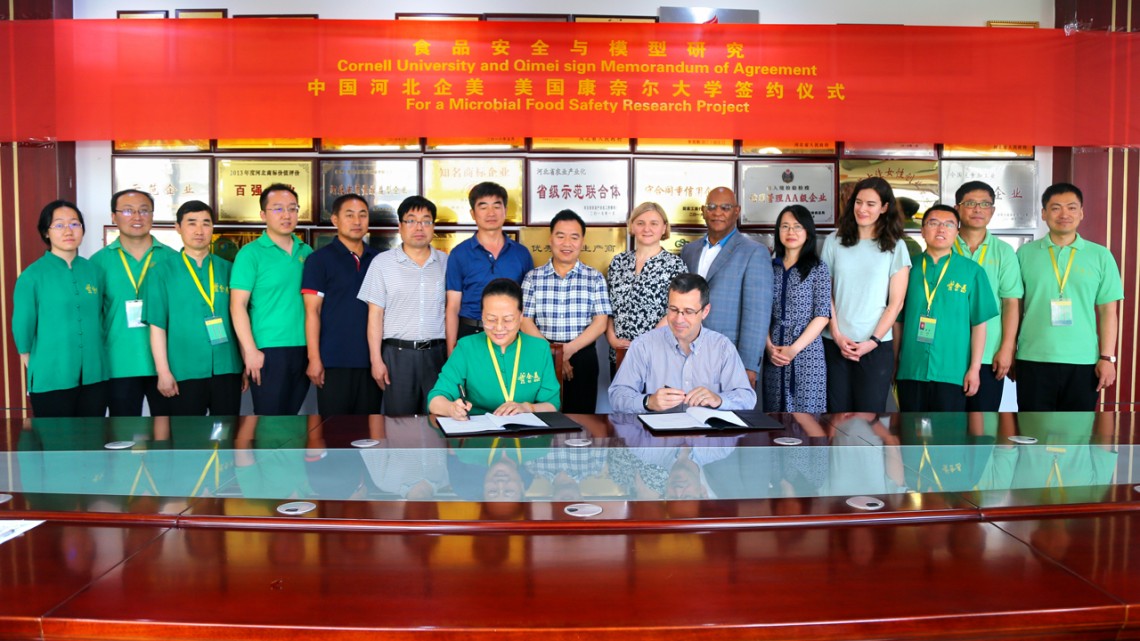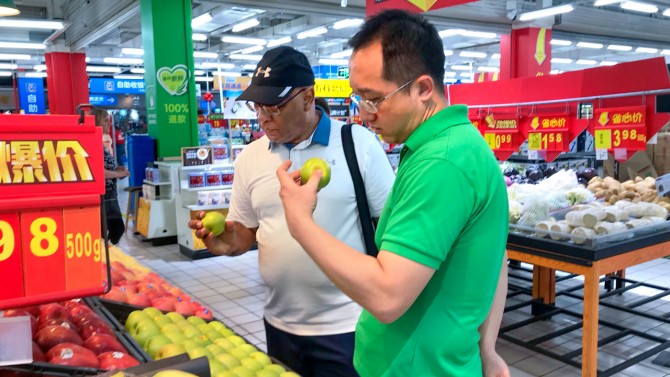
Yuqi Zhao, president of Qimei, left, and Martin Wiedmann, sign an agreement to collaborate on microbial food safety research
Partnership will advance food safety research in China
By Blaine Friedlander
Cornell and China’s Hebei Qimei Agriculture Science and Technology Co. Ltd., an organic food group, signed an agreement in June to collaborate on microbial food safety research. The agreement was funded by a three-year, $2.5 million grant from the Walmart Foundation to Cornell.
The Walmart Foundation’s Enhancing Sustainable Food Safety giving strategy focuses on efforts to increase transparency, and improve producer and consumer education.
The Cornell team – with faculty from the College of Agriculture and Life Sciences, the Dyson School of Applied Economics and Management, and the College of Veterinary Medicine – aims to take a whole-system, sustainable-model approach that integrates food safety and economic analysis.
“We will be working with our colleagues in China to develop new models to improve food produce quality and safety, and reduce food waste,” said Martin Wiedmann, Cornell’s Gellert Family Professor in Food Safety, and one of three principal researchers from Cornell. The other principals are Ralph D. Christy, professor of applied economics and management at Dyson, and Renata Ivanek, associate professor in the veterinary college’s Department of Population Medicine and Diagnostic Sciences.
Safety has emerged as a major concern for private food companies, policymakers and consumers in China. Last month, China put forward a food safety proposal in which 98% of all products meet spot-check standards by 2020 and that the caliber of China’s food safety will be considered among the world’s best by 2035, according to the trade newsletter FoodNavigator–Asia.
The Cornell researchers will collect data on bacterial types and levels, storage temperatures, shelf life, prices and spoilage rates at critical points along the fresh produce supply chain.
Qimei – based in Handan, Hebei, south of Beijing – is one of China’s largest organic farms and was an official supplier to the 2008 Beijing Olympics. The company previously has partnered with other Cornell groups, including the former Cornell International Institute for Food, Agriculture and Development, the Department of Food Science, and the Department of Crop and Soil Science for projects on food safety, soil testing and organic certification initiatives. Qimei’s fresh produce production and distribution systems will be used to test the new food safety models.
“Food safety is a driver of this project,” Christy said. “We’re developing a novel approach to comprehensively examine food quality and safety issues from farm to processing, distribution, the food store and then finally to the table. It’s a very intensive data collection process.”
In addition to improving food safety, Ivanek said, reducing food waste is key.
“We must identify ways to reduce food waste and create environmental benefits to consumers and producers,” she said. “If we waste a lot of food product, then producers must compensate by making more product. That creates a burden for the environment, while making the product more expensive both for the consumer and the producer.”
Food quality and sustainability go hand in hand, Ivanek said. “This is a global problem and this is a great opportunity to map the whole system in China,” she said.
Importantly, this grant allows Cornell faculty and students to conduct research in China, Wiedmann said: “Food safety, quality and sustainability are global challenges. It is essential for Cornell to engage worldwide.”
Media Contact
Get Cornell news delivered right to your inbox.
Subscribe

